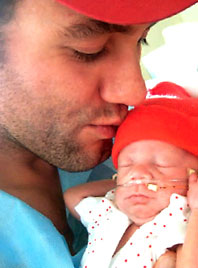NICU: Baby Zadie's Story
Go! Baby, Go! 
When Zadie Brown was born 12 weeks early, she weighed only 2 pounds, 2 ounces.
"I worried that every breath would be her last," says Zadie's mom, Meghan Chapple-Brown, with tears in her eyes.
Because of serious pregnancy complications, Zadie was born at only 28 weeks. She spent 46 days in Holy Cross Hospital's Neonatal Intensive Care Unit (NICU), the largest NICU in the state.
"The medical and emotional support from the NICU staff and love of family and friends is what got us through," says the 36-year-old mother.
Highest-Quality Care
While all premature babies are at risk for health problems, those born before 32 weeks are at greater risk for serious complications. The biggest challenge for Zadie was a significant breathing problem called respiratory distress syndrome (RDS).
Babies with RDS lack a protein called surfactant, which keeps small air sacs in the lungs from collapsing. Zadie was treated with replacement surfactant to coat her lungs and to allow for easier breathing, and a small plastic tube placed in her nose continuously delivered pressurized air to her lungs.
"We offer the highest degree of quality care for critically ill newborns," says Sharon Kiernan, MD, medical director, Neonatology Services. "Our Level IIIB NICU features state-of-the-art technology to treat babies who are born early or have medical complications that require constant observation or specialized care."
Because of her underdeveloped central nervous system, Zadie sometimes stopped breathing, a condition called apnea. Babies in the NICU are constantly monitored for apnea. When external stimulation does not remind the baby to start breathing, a nurse quickly covers the baby's face with a mask to pump oxygen into the lungs.
"Zadie had to be resuscitated twice, and it was terrifying," Meghan says. "The nurses were very calm and very professional. They and the doctors were always reassuring us while keeping us in touch with the realities that Zadie faced."
Another common problem found in premature babies is a heart defect called patent ductus arteriosus (PDA). Before birth a large artery lets blood bypass the lungs, because the fetus gets its oxygen through the placenta. This artery normally closes soon after birth so that blood can travel to the lungs to get oxygen. When the artery does not close properly, it can lead to heart failure.
A specialized form of ultrasound, called echocardiography, helped physicians diagnose Zadie with PDA, and medication helped close the artery.
Prepared for Complications
The NICU team - including neonatologists (physicians who specialize in newborn care), registered nurses, neonatal nurse practitioners, physical therapists, respiratory therapists, social workers, case managers and lactation consultants - also carefully monitored Zadie for common medical complications faced by premature babies, including the inability to maintain body temperature, brain damage, vision loss, jaundice and reflux.
Coordinating patient care in the NICU is a nurse navigator, who works with each family to answer questions and to ensure that each baby has everything he or she needs to thrive. For families interested in spiritual support, chaplains are available to patients and families of all faiths and beliefs.
"We couldn't have asked for better care and attention from Holy Cross Hospital's doctors and nurses," Meghan says. "We were there for two months, and they became our family. I have the utmost confidence in their care and trust in their staff."
Holy Cross Hospital delivers more babies than any other hospital in Maryland or the District of Columbia.
"And if pregnancy complications occur, we offer a unique on-call service through which obstetricians can consult with a maternal-fetal medicine specialist and admit high-risk patients to Holy Cross Hospital under the specialist's care," says Ann B. Burke, MD, medical director, Obstetrics and Gynecology.
Ongoing Support
Reminiscing about Zadie's discharge from the NICU, Meghan says, "Taking Zadie home for the first time was an amazing and wonderful day."
But leaving the NICU and going home also can be scary because physicians and nurses are no longer providing around-the-clock care. To ease the transition, a Holy Cross Home Care nurse visited the Brown family the very next day. The home care nurse did a full assessment of Zadie and during the next three visits helped the family with breathing and feeding difficulties.
"Today, there are no lingering medical issues, and she has caught up to her peers," Meghan says. All her NICU worries are behind her. "Zadie loves to dance," Meghan says. "You should see her salsa. It's hysterical!"
